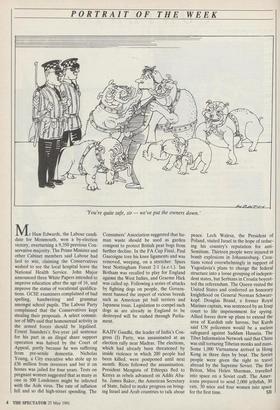PORTRAIT OF THE WEEK
`You're quite safe, sir — we've put the owners down.'
Mr Huw Edwards, the Labour candi- date for Monmouth, won a by-election victory, overturning a 9,350 previous Con- servative majority. The Prime Minister and other Cabinet members said Labour had lied to win, claiming the Conservatives wished to see the local hospital leave the National Health Service. John Major announced three White Papers intended to improve education after the age of 16, and improve the status of vocational qualifica- tions. GCSE examiners complained of bad spelling, handwriting and grammar amongst school pupils. The Labour Party complained that the Conservatives kept stealing their proposals. A select commit- tee of MPs said that homosexual activity in the armed forces should be legalised. Ernest Saunders's five-year jail sentence for his part in an illegal share support operation was halved by the Court of Appeal, partly because he was suffering from pre-senile dementia. Nicholas Young, a City executive who stole up to f36 million from investors and bet it on horses was jailed for four years. Tests on pregnant women suggested that as many as one in 500 Londoners might be infected with the Aids virus. The rate of inflation fell and so did high-street spending. The Consumers' Association suggested that hu- man waste should be used as garden compost to protect British peat bogs from further decline. In the FA Cup Final, Paul Gascoigne tore his knee ligaments and was removed, weeping, on a stretcher. Spurs beat Nottingham Forest 2-1 (a.e.t.). Ian Botham was recalled to play for England against the West Indies, and Graeme Hick was called up. Following a series of attacks by fighting dogs on people, the Govern- ment banned the import of vicious breeds such as American pit bull terriers and Japanese tosas. Legislation to compel such dogs as are already in England to be destroyed will be rushed through Parlia- ment.
RAJIV Gandhi, the leader of India's Con- gress (I) Party, was assassinated at an election rally near Madras. The elections, which had already been threatened by inside violence in which 200 people had been killed, were postponed until next month. Riots followed the assassination. President Mengistu of Ethiopia fled to Kenya as rebels advanced on Addis Aba- ba. James Baker, the American Secretary of State, failed to make progress on bring- ing Israel and Arab countries to talk about peace. Lech Walesa, the President of Poland, visited Israel in the hope of reduc- ing his country's reputation for anti- Semitism. Thirteen people were injured in bomb explosions in Johannesburg. Croa- tians voted overwhelmingly in support of Yugoslavia's plans to change the federal structure into a loose grouping of indepen- dent states, but Serbians in Croatia boycot- ted the referendum. The Queen visited the United States and conferred an honorary knighthood on General Norman Schwarz- kopf. Douglas Brand, a former Royal Marines captain, was sentenced by an Iraqi court to life imprisonment for spying. Allied forces drew up plans to extend the area of Kurdish safe havens, but Kurds said UN policemen would be a useless safeguard against Saddam Hussein. The Tibet Information Network said that China was still torturing Tibetan monks and nuns. Some 1,000 Vietnamese arrived in Hong Kong in three days by boat. The Soviet people were given the right to travel abroad by the Supreme Soviet. The first Briton, Miss Helen Sharman, travelled into space on a Soviet craft. The Amer- icans prepared to send 2,000 jellyfish, 30 rats, 30 mice and four women into space


















































 Previous page
Previous page